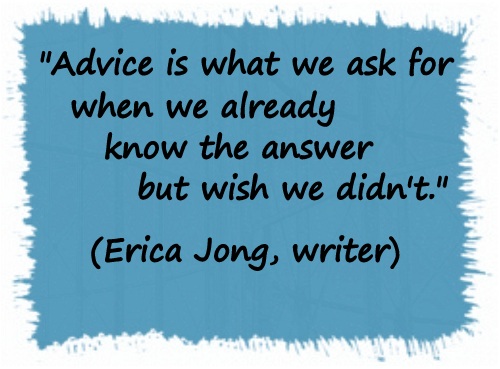Coaching Quote of the Day 12th October 2012

“Advice is what we ask for when we already know the answer but wish we didn’t.”
(Erica Jong, writer)
Do you agree?
Feel free to share your thoughts below

“Advice is what we ask for when we already know the answer but wish we didn’t.”
(Erica Jong, writer)
Do you agree?
Feel free to share your thoughts below
“To ask the hard question is simple.”
(W H Auden)
W. H. Auden said, “To ask the hard question is simple.” Do you agree? As a coach have you ever found a question difficult to ask?
Personally I’ve found that one of two things is going on if I, or another coach is thinking that a potential question is hard or difficult to ask.
1) There’s some concern there about what the client will think of the coach if that question is asked.
2) There’s something about the question that you want to ask that you think will potentially provoke an “ouch” reaction from your client.
The following is my thoughts and approach about each of those scenarios plus some suggestions about what you can do if you find yourself in either.
What will the client think of me if I ask that question?
I think many coaches experience this particularly when they are first learning coaching skills and again when they start charging for their services. It’s not at all compulsory but equally it’s not uncommon.
If your only concern is about what your client will think if you ask that hard question, are you really serving your client by not asking it? After all, that coaching conversation is not about you.
All of which you may agree with in theory but what do you do if you still find your attention wandering in the middle of a session?
You could notice what you are doing “beat yourself up” and criticise yourself as a bad coach. Or you could just congratulate yourself for noticing and simply bring your focus back to the coaching conversation and your client.
I find that just noticing and bringing your focus back is normally sufficient. If that isn’t working do one of the many techniques to quiet that “inner critic”. You could mentally tell it “not now, I’m working”, tell it to go away in no uncertain terms or imagine it’s something that is being whispered from a very long way away.
You may also want to add an external reminder somewhere that it really isn’t about you. Maybe it’s a post it note that just says, “It’s not about [your own name]”, or perhaps it’s something else that will act as a prompt when you are actually coaching.
There’s something about the question that you want to ask that you think will potentially provoke an “ouch” reaction from your client.
You may have formed this opinion based on what you already know about your client. It may be something that you are using your own beliefs and values and decided that anyone would respond with an “ouch”.
This does not mean that the question you have in mind is not a good one. It could be just the one that is going to make all the difference to your client. You may want to consider how you present the question.
Your style may naturally be blunt, so it’s quite possible that your client already expects you to ask the hard questions without a moment’s hesitation. You may even have set up the expectations that this may happen before you’ve even started coaching together.
If this does not suit your style, and I’m not saying it’s right or wrong – just one approach, here are some other suggestions:
Some will give you full permission to just “go for it”, others will make it clear that blunt is not what they want to hear right now.
Notice their response. They are likely to be curious and it’s quite possible that they will give you permission to ask that question.
Once someone has given you permission to ask a question they are far more likely to answer.
One way you can do this is to put the “question” out there as a thought or something that you were wondering. “I was just wondering …” (delivered in a non-aggressive manner) is a much more gentle way of asking the question.
You may also introduce it as “I’m curious …”
Finally, a question is just a question. Sure there may be ways and methods that you use to make it easier for a client to hear (or for you to ask), but it’s still just a question.
What other ways do you use to ask “hard” questions?
Have you got anything you want to say on the topic?
I invite you to leave your views below and click submit comment.